
January 2023
For Class Struggle Against Militarism
Germany: War in the East

Federal Chancellor Olaf Scholz (SPD) with “Cheetah” anti-aircraft tank, 25 August 2022. (Photo: Axel Heimken/Pool)
U.S. / NATO / European Union
The Warmongers Are Here
German Imperialism Out of East
Europe!
Break With Reformism, For a Multiethnic Revolutionary
Workers Party!
The following article is translated from Permanente Revolution No. 6, Winter 2022-23, published by the Internationalistische Gruppe, German section of the League for the Fourth International.
Among the rulers there is consensus: the war in Ukraine represents a turning point in the history of post-war Germany. Or rather, pre-war Germany. Because since 24 February 2022, Germany has clearly been in the middle of a war. Imperialist capitalism, under its leading power United States and its military alliance, NATO (North Atlantic Treaty Organization), is trying to inflict a bloody defeat on the capitalist regional power Russia on the battlefields of Ukraine. By joining the U.S./NATO war drive against Russia – and after that, China – the Berlin government wants to assert Germany as Europe’s military, and not just economic, superpower.
Achieving this will also have huge domestic ramifications, with falling incomes and slashing social benefits, accompanied by an attack on fundamental rights in the name of “well-fortified democracy” (wehrhafte Demokratie). As inflation, spurred by war and anti-Russia sanctions, grinds down the working people, the immiseration of the masses is a necessity for German capital, not just a political option. Thus the struggle for food and fuel, for health and housing, clashes with the imperialist war drive and the chaos of the capitalist system. Even in the most elementary struggles, it is becoming increasingly clear that the time for reforms is long gone and only a struggle for socialist revolution can prevent catastrophe.
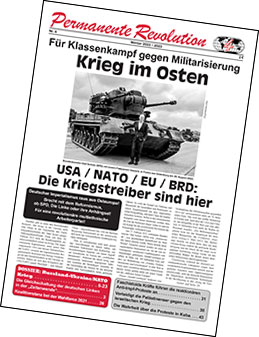 Permanente Revolution No. 6, Winter 2022-23.
Permanente Revolution No. 6, Winter 2022-23.
On 27 February 2022, federal chancellor Olaf Scholz (of the Social-Democratic Party) announced a Zeitenwende, a “historic turning point.” This was then officially chosen as the word of the year. What is this turning point? First of all, a special fund is to be set up in the otherwise tightly controlled state coffers, its independence from the government budget enshrined in the Basic Law (Germany’s constitution). In the amount of 100 billion euros, the fund is intended to promote “peace, freedom, democracy and justice” around the world in the form of beefed-up German militarism. Scholz boasted that this was his vision of the “strongest army in Europe.”
This “special fund” means a doubling of military spending compared to 2014, likely exceeding 70 billion euros. This will be the largest military budget in Europe and, after the U.S. and China, the third largest in the world (spending €10 billion a year more on arms than Russia). The main organ of the German bourgeoisie, the Frankfurter Allgemeine Zeitung (3 March 2022), was not the only one to rejoice over this “blow for liberation.” The “liberation” consists above all in the fact that, with the Ukraine war, the political rationale and pressure for an arms drive that had been planned long before was finally achieved in order to push through the needed financing for the new German militarism.
At the same time, while the alternative social democrats of the Left Party are reeling from its repeated capitulations and have lost all semblance of an opposition party, the German bourgeoisie sees an opportunity to enlist pacifist currents in the population in the “war for peace”. When only the fascistic German-nationalist Alternative for Germany (AfD) and its consorts seem to be challenging the war and its consequences, any opposition to the war is labeled “authoritarian” by the government and its supporters. Of course, the AfD, which vows to uphold “military strength,” has no problem with the arms program and can only suggest freeing up even more funds by axing development aid from the budget.
“Traffic Light” Coalition Government:
Green Light for
Militarization and More Capitalist Exploitation
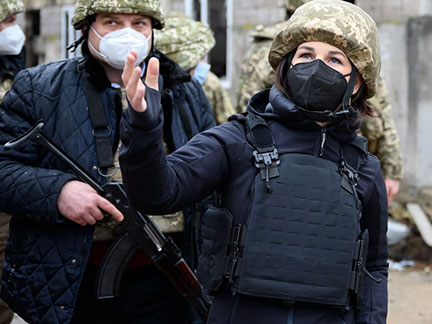 Greens to the front. As in
the 1999 NATO war that destroyed Yugoslavia, the Greens are
at the forefront of the warmongers. Right: German Foreign
Minister Annalena Baerbock on 8 February 2022 during visit
to Shyrokyne (near Mariupol), a stronghold of the fascist
Azov Battalion and Pravyi Sektor spearheading the murderous
war against the Russian-speaking population of Donbass
since 2014. (Photo: Die Welt)
Greens to the front. As in
the 1999 NATO war that destroyed Yugoslavia, the Greens are
at the forefront of the warmongers. Right: German Foreign
Minister Annalena Baerbock on 8 February 2022 during visit
to Shyrokyne (near Mariupol), a stronghold of the fascist
Azov Battalion and Pravyi Sektor spearheading the murderous
war against the Russian-speaking population of Donbass
since 2014. (Photo: Die Welt)As we noted more than a year ago, the “traffic light” coalition of Social Democrats (SPD, red), Free Democrats (FDP, yellow) and Greens was made possible by the virtual unanimity of bourgeois politics:
“With German borders sealed off to refugees, there is an all-party consensus around support for the police and the Bundeswehr (army), subsidies for capitalists and austerity for everyone else. This line-up permits an almost kaleidoscopic variety of possible governmental coalitions, including the free marketeers of the Free Democrats.”
–“Germany: Coalition Dance in the 2021 Election Farce,” The Internationalist No. 64, July-September 2021
A temporary exception would be made for Ukrainian refugees.
While Scholz’s statement was being prepared in secret, and with the outbreak of the Ukraine conflict as a pretext, the coalition and its member parties had all long ago committed themselves to the massive arms program, with the Greens being the most fanatical proponents of demonizing Russia. The propaganda campaign about the “new responsibilities” of German imperialism and the attack on the “pacifism” standing in its way began even before the 2014 Kiev coup and the subsequent unification of Crimea with Russia. The NATO partners had already agreed to move towards the target of raising military expenditures to 2% of the gross domestic product.
Since 2014, the military budget has been increased from €32.5 to €50.3 billion euros ($36 to $55 billion dollars), in accordance with the previous (2013) coalition agreement between the SPD and the Christian Democrats. So much for the myth of a “kaput Bundeswehr due to budget savings.” In fact, the long-term projects of the special fund have nothing to do with soldiers’ underwear or even “assistance” for the Ukrainians. They mainly concern the Air Force and the Navy. A particularly sinister aspect is acquiring F-35 stealth bombers from the U.S., which are intended for “nuclear sharing,” i.e., the transport of U.S. nuclear bombs.1 This is federal finance minister Christian Lindner’s goal of building the “strongest and most powerful army in Europe.”
The coalition slyly announced the cabinet decision to raise the minimum wage to €12 an hour at the same time as the arms program, thus promising both butter and guns.2 SPD general secretary Kevin Kühnert claimed that the special fund maneuver meant “the traffic light government does not have to renounce any of its social goals” (Spiegel, 30 May 2022). Nonsense. The coalition agreement’s promise to ease surveillance and harassment of the unemployed enshrined in Hartz IV3 proved worthless, as the increase in the standard payment barely offset inflation. A sinister alliance of employers, CDU (Christian Democrats) and the AfD fiercely resisted, and the changes were voted down in the Bundesrat (the upper house of Germany’s legislature). In the end, only the name changed – these crumbs are now called “citizen’s income.”
In fact, as agreed with CDU leader Friedrich Merz (who is also a top executive of the BlackRock investment behemoth, responsible for its German operations), who is de facto the fourth member of the coalition, some projects, such as cybersecurity, were not included in the €100 billion special fund. In a few years, they will have to be compensated by social austerity measures, which will certainly include raising the retirement age. It also means cuts in education and both health care and medical supplies, despite the ongoing threat of COVID. Even before the war, the head of the employers’ association, Rainer Dulger, said, “A spendthrift social policy is not sustainable. That is why we are promoting a more flexible retirement age and concentrating unemployment insurance on core areas” (WirtschaftsWoche, 29 December 2021).
The economic plight afflicting millions of people has deep roots. In the east, where more than 100,000 people demonstrated against the war and its consequences on October 3, the day of German unity, average wages are €12,000 a year lower than in the west, while half of all retirees there receive less than €1,200 euros a month in pension payments. This is a consequence of the deliberate destruction of the economic base after the counterrevolutionary annexation of East Germany (the DDR, or German Democratic Republic). And although current price hikes are a result of sanctions against Russia, a half-hearted attempt by sections of the Left Party to call protests for purely economic demands without mentioning the war flopped. No wonder the rightists are profiting from that.
Across-the-Board Repression
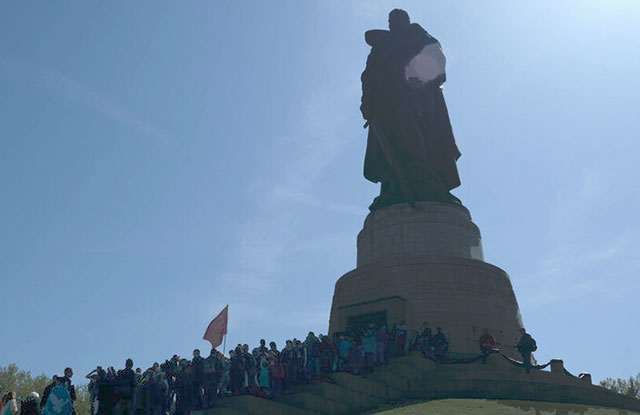
Soviet War Memorial in Treptower Park, on 9 May 2022, the day of liberation, marking the Red Army’s victory over Nazi Germany. In large parts of Berlin, the SPD/Left Party/Green city government banned the display of Soviet flags. (Photo: Massimo Rodari / Imago)
“Thoughts are free” says the folk song (which was often used for anti-communist propaganda). Not so much these days. The hysterical anti-Russian witch-hunt campaign is now being enforced by law. Not only is there the incessant barrage against “Putin understanders” and “Russian disinformation,” extending to outright bans of Russian media (such as RT), as well as cancellation of performances of music composed by Russians a century before the current war. Now booksellers are being taken to court for allegedly endorsing the Russian war in Ukraine in an address at the Soviet War Memorial in Treptower Park last June 22, the anniversary of the Nazi invasion of the Soviet Union in 1941 (Junge Welt, 12 December 2022).
On March 28, the Federal Ministry of the Interior announced, “Russia’s war of aggression against Ukraine is a criminal offence. Anyone who publicly approves of this war of aggression may be liable to prosecution. This also applies to showing the ‘Z’ symbol.” The letter Z, said to stand for Za Pobedu (To Victory), is therefore taken as a symbol of public support for the Russian army. The statement came after ministries in some states – including Lower Saxony, Hanover, North Rhine-Westphalia, Thuringia and Bavaria – announced similar plans to go after those who publicly support Russia. Lower Saxony and Bavaria threaten perpetrators with up to three years in prison.
In October, the German Bundestag tightened the so-called “incitement paragraph” § 130 of the Criminal Code. From now on, anyone who publicly “approves, denies or grossly downplays” genocide, crimes against humanity and war crimes can be punished with imprisonment for up to three years – a deliberately vague formulation. The fact that this is primarily aimed at today’s Russia was then dramatically underlined by the resolution on “Holodomor in Ukraine” passed by the Bundestag on November 30. It defines the famine that ravaged the entire Soviet Union in 1932-33 – the result of a drought and Stalin’s disastrous policy of forced collectivization – as “genocide” allegedly aimed specifically at the Ukrainian nation.
This rewriting of actual history was devised and propagated decades ago by the remnants of the Bandera fascist group of exiled Ukrainian nationalists. But now journalists, historians, teachers and others who contradict this bogus claim of “genocide” risk up to three years in jail. Censorship in the service of the fascists who spearheaded the recruitment of imperialist auxiliary troops in the Ukraine – that actually amounts to a step-by-step rehabilitation of the Third Reich. That’s how it was on 8-9 May 2022 during the commemoration of the liberation of Germany from fascism in 1945, when hoisting the Soviet flag was forbidden in large parts of Berlin.
And toward year’s end, while scandals surrounding fascist nests in the police and army are still on the order of the day, the government attempted to buff up its “democratic” credentials in December by theatrically rounding up a few dozen fascistic “Reichsbürger” who were involved in a comic opera coup. (The BND, Germany’s FBI, has not yet published the documentation on this.)
Unleash the Power of the Working Class
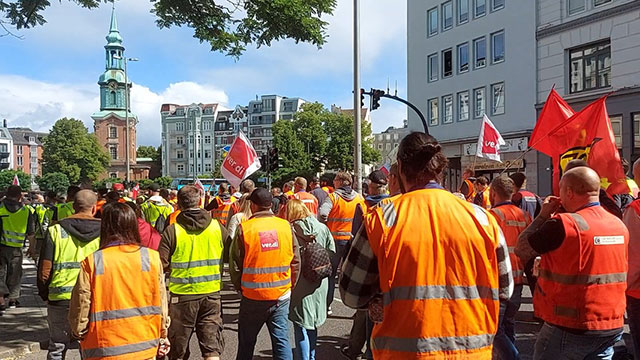
Port workers in Hamburg on strike in July 2022 under the slogan “Stop the inflation monster.” The bosses tried to avert the strikes with injunctions from the local labor court, to no avail. When the police tried to arrest demonstrators, the striking workers put up a strong defense. It was the longest industrial dispute in the ports for more than 40 years. (Photo: Norddeutscher Rundfunk)
The German bourgeoisie intends to pass on the rising costs of inflation to the working class in Germany and to bind working people and the poor to the hardships of an economy of war and scarcity: “Freeze for Ukraine.” Since the beginning of 2022, impoverishment has rapidly increased, recognizable for example in the overburdened free food distribution of the voluntary (non-governmental) “Tafeln,” which are completely overrun with applicants and now register 2 million people dependent on their services, roughly 750,000 more than in the previous year, including many war refugees from Ukraine, unemployed, pensioners and low-wage earners.
In a “concerted action,” an institutionalized form of class collaboration, the union leaders were brought on board in order to keep the working class quiet with a deliberate and confusing jumble of demands and concessions. But the message was clear in the end: when push comes to shove, the union bureaucracy will try to save German capital at the expense of the working class. In particular, it sees itself as a full partner in the governing coalition: “There is so much trade-unionism in the traffic light coalition,” enthused IG Metall (the metal workers union) in December 2021. The bureaucracy has sometimes even given up any pretense of an independent role: “Exorbitant inflation rates cannot be compensated for by collective bargaining,” explained Roman Zitzelsberger, head of IG Metall in the key district of Baden-Württemberg (Stuttgarter Zeitung, 23 May 2022).
Scholz had every reason to praise the “so far quite prudent wage policy” of the DGB (German Labor Federation) bureaucrats. In November 2021, ver.di (the public sector and white collar employees union) accepted a 2.8% wage increase for public sector employees, particularly in health care. Since there was no strike, members were not allowed to vote on these results. In September 2022, IG Bergbau, Chemie, Energie (the mine, chemical and energy union) agreed on two wage increases of 3.25% over two years, i.e., 6.5%, plus two one-time payments of €1,500 for workers in the chemical industry. In October, IG Metall in Baden-Württemberg accepted a wage increase of 5.2% in June 2023 and 3.3% in May 2024, plus two one-time payments. All of these cases were cuts in real wages, given that annual inflation then was over 10% (and the rise in key energy and food costs is much higher).
However, we should remember what happened in the first instance of “concerted action,” launched in 1967 to curb wage demands and serve as a break on inflation. The union bureaucracy naturally cooperated and met regularly with representatives of the government, employers’ organizations and the Bundesbank (Germany’s federal bank). Real wages started falling. However, this led to a series of wildcat strikes, mainly in the mining and steel industries, but also in the public sector – the famous September 1969 strikes of up to 140,000 workers, resulting in significantly increased wages for over 8 million workers.
In the midst of this chain of betrayals, we already had a foretaste of the potential power of the working class. Last July 15 [2022], there was a 48-hour strike in German ports and demands for inflation-compensating wage increases against the real wage loss. After a judicial ban on strikes failed, the bosses and their capitalist state responded with brutal police action and a ban on further strikes prior to collective bargaining at the end of August. The power of the several thousand workers in Germany’s largest port city of Hamburg was demonstrated as they faced down the cops in riot gear who had attacked them earlier, pushing back amid physical altercations and chanting, “We are the port.” In the end, the dockers won up to just over 9%, with a new round of negotiations in 2023.
The much-promised “Hot Autumn” of social unrest has not materialized thanks to the pro-capitalist union bureaucracy and the Left Party, who act as a fire department to contain potential hot spots and deflect “uncontrolled” eruptions of class struggle. Ultimately, what’s needed is a proletarian counter-offensive against imperialist war that puts forward transitional demands – ranging from reduced working hours without a loss in pay and a sliding scale of wages (a cost-of-living escalator) to workers control of factories. Such demands are at bottom incompatible with capitalism and must point the way to socialist revolution. This means a struggle for a revolutionary workers’ party of the proletarian vanguard that will break the stranglehold of the reformists and unleash the dormant power of the working class in Germany.
Against the Threat of
De-Industrialization –
For a Red Europe of Workers’ Councils!
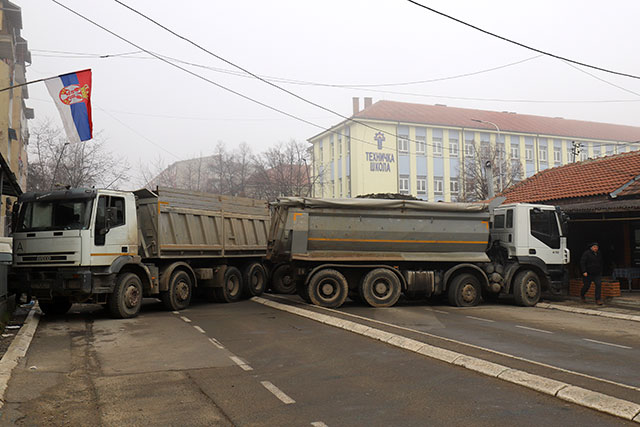
Trucks block roads in the Serbian district of Mitrovica, Kosovo, 27 December 2022. The protests by the besieged population in the Serb-inhabited area of Kosovo were sparked by a provocation approved by the (German) EU High Commissioner for Kosovo. Chancellor Scholz has announced that Germany intends to take the Western Balkan states under its tutelage. (Photo: Bojan Slavkovic / Reuters)
Heeding Washington’s call for sanctions on Russia, the German and European Union (EU) rulers have managed to shoot themselves in the foot. Since the 19th century, in two world wars, German imperialism has been fueled by a “Drang nach Osten” (“drive toward the East”) to meet its needs for raw materials, fossil fuels and food. For decades, German industry has been profitable because of its access to cheap Russian natural gas. No longer. Over time, it is no solution for German capital to purchase expensive liquid natural gas from the U.S. and Qatar while half the world – and especially China – buys cheap Russian energy supplies. The German economy will lose its competitiveness on the world market. In the short run, this can only be compensated for by a sharp reduction in the standard of living of working people in Germany and the EU.
The attempt to isolate Russia from the world market by the sanctions regime failed right from the start. Now the German bourgeoisie, after its initial delusions about the “deindustrialization of Russia” (from EU chief Ursula von der Leyen), is itself threatened with deindustrialization. Out of economic necessity, it has taken up the cause of subjugating Russia through defeat on the battlefield in Ukraine and regime change in Moscow. This has increased the risk of a nuclear war enormously. But Russia can hit back, with impact. For the working people, oppressed and poor of the world, the question has hardly ever been sharper since World War II: it’s either socialism or barbarism.
The COVID-19 pandemic – which has killed over a million people in the EU, along with border closures, lockdowns and fights over protective equipment and compulsory vaccination – has exposed the fragility of the European Union as an imperialist alliance. Likewise, the all-round disruption of the world market, which makes clear the contradiction between, on the one hand, the suffocating framework of private property and national borders and, on the other hand, the international development of production. And all this is exacerbated by the attempt to force Russia to surrender through sanctions. Italy and Spain, for example, which have never relied on Russian gas to the extent that Germany has, want to know why they should reduce their energy use to offset Germany’s lower gas supplies.
Germany is scrambling to replace Russian gas (the much-ballyhooed deal with Qatar will cover just under 3% of its gas consumption), and U.S. exports are unlikely to fill the gap. The effects can already be felt in production cuts (e.g., fertilizers) in the chemical industry: BASF is threatening to dismantle its European plants (including its giant base in Ludwigshafen) and relocate them to the United States and China. ArcelorMittal has already shut down steel factories in the face of high energy prices: “Production in Germany is no longer competitive” (Die Welt, 12 September 2022). But the EU persists in self-destructive anti-Russian sanctions, and is lodging gentle complaints in Washington over the subsidies the U.S. government is giving to its electric vehicles and renewable energy branches.
In view of the enormous difficulties in its economic and military reorientation, German imperialism would like to streamline and centralize the European alliance it dominates. Scholz said as early as July 2022 that the European Union could no longer afford national vetoes because they would take away the EU’s security and foreign policy decision-making powers. But he cannot avoid the fact that the alliance is not a European “superstate,” that the various bourgeoisies have their own national interests. The continent remains very vulnerable to U.S. imperialism’s divide-and-conquer schemes. A hundred years later, there are echoes of when Washington intended, as Leon Trotsky said, to “put Europe on rations”. On that occasion (1924) he noted, “Before our eyes, European social democracy is being transformed into a political agent of American capital.” Today as well, aided and abetted by the Greens.
At the same time, the German imperialists want to expand the EU. While meeting resistance from the Polish nationalist government in Warsaw, they want to revive their involvement in southeastern Europe under the umbrella of NATO. After Berlin pushed ahead with the destruction of the multinational deformed workers’ state of Yugoslavia in the 1990s (recognition and arming of the fascistic government in Croatia, support for the UCK in Kosovo), the SPD-led government now wants to expand its sphere of influence in the Balkans. Scholz recently wrote about “The global turning point” in the influential American magazine Foreign Affairs (5 December 2022) that:
“EU accession of all six countries of the western Balkans must finally become a reality, a goal to which I am personally committed. That is why I have revived the so-called Berlin Process for the western Balkans, which intends to deepen cooperation in the region, bringing its countries and their citizens closer together and preparing them for EU integration.”
The Internationalist Group, section of the League for the Fourth International, on the other hand, says: German imperialism, out of Eastern Europe!
With the strike wave in Britain and the looming pension dispute in France (see article on page 5 of this issue), where surveys show unions and three-quarters of the population are flatly opposed to raising the retirement age, Europe is showing the first signs of a revival of the class struggle. It is developing excruciatingly slowly, in large part because of the lack of revolutionary political leadership with the political courage to fight imperialist war head-on. Not only the governing Social Democrats, but also the overwhelming majority of the so-called “far left” have become mere PR agents for the imperialist war drive. Why was there no “hot autumn”? That’s why, right there.
For internationalist, revolutionary class struggle! The main enemy is at home! Replace capitalist governments through socialist revolutions from Berlin to Washington, from Kyiv to Moscow. This is only possible through the reforging of a Fourth International that embodies the program of authentic Trotskyism. ■
- 1. The idea of nuclear bombs in the hands of the German army makes a lot of people nervous. In order to assuage those fears while heading off any German effort to achieve an independent nuclear capability, as well as to get around the nuclear non-proliferation treaty and to ensure that the German army was on board if nuclear arms are to be used, NATO chiefs came up with “nuclear sharing,” under which countries like Belgium, Canada and Germany would have nuclear weapons stored on their territory and would acquire planes capable of carrying nuclear bombs, which they would fly together with U.S. personnel (who would have the link to permission codes to arm them).
- 2. In World War II, as food supplies were getting tight, the Nazi president of the Reichstag and air force chief Hermann Göring rhetorically asked if the German population wanted butter or guns.
- 3. In 2004, the Social Democratic-led federal government introduced the Hartz IV reform of social program legislation that introduced forced labor (paying 1 € an hour) to qualify for welfare payments and steep cuts to unemployment benefits.
